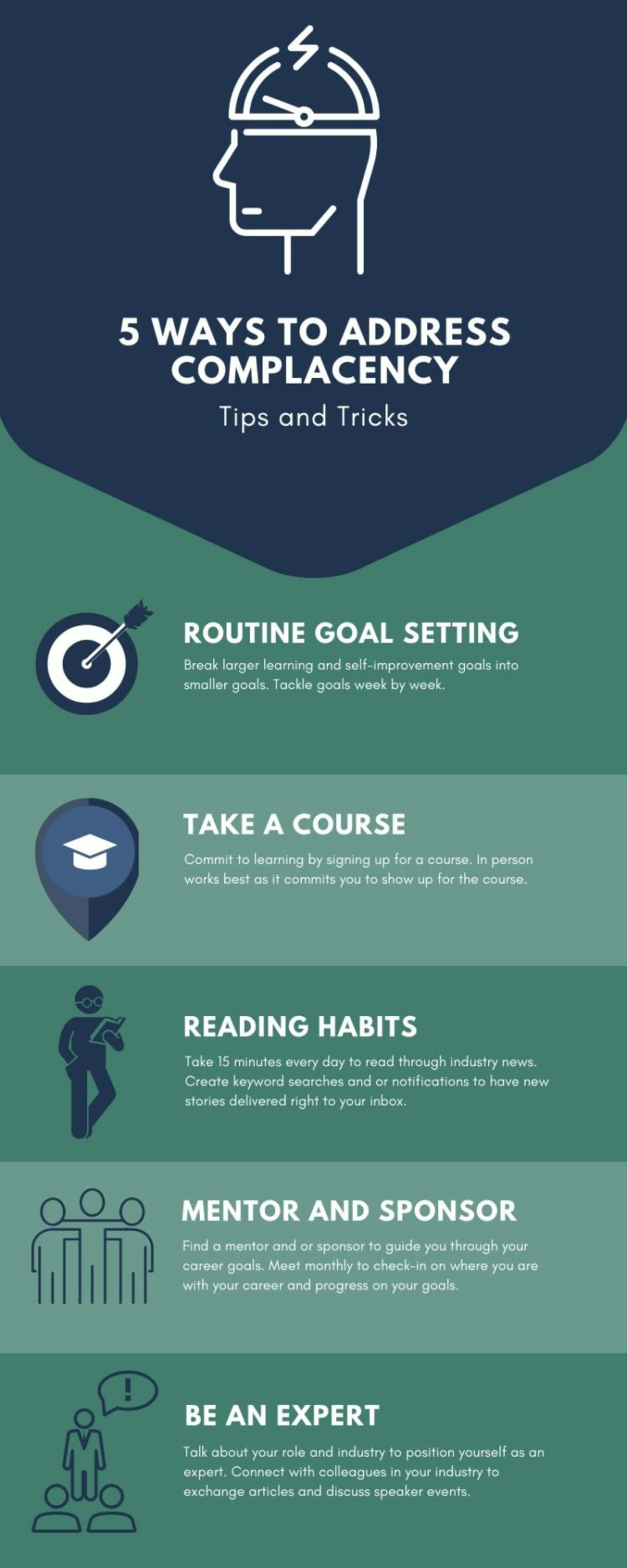Have you spent some time in your role and feel comfortable with what you are doing? Are you fairly happy with your work, your coworkers, and your manager? Do you have a routine that you stick to?
While none of the above are definitive or psychologically validated questions for establishing complacency, answering yes to any of the questions could mean that you are being complacent in your career. This is dangerous as what work we do and how we work is changing dramatically. Being complacent is the difference between becoming obsolete or thriving at your company.
Key takeaways
- Complacency can be detrimental to your career
- Recognize the signs of complacency early and take action to address them
- Find ways to continuously learn in your field and have others support you in your progress
Why recognizing complacency is important
Recognizing complacency and nipping it in the bud is important for ensuring career growth and success. Companies are changing at a rapid pace and, with that, so are their talent needs. Additionally, the job market is highly competitive with lots of individuals who may have similar skills as you.
Being complacent with your skills development can make you obsolete in the company. It also makes you less competitive when compared to your colleagues for promotions. Lastly, complacency can also mean missing out on special projects and or assignments. High visibility projects with special clients or in foreign offices go to those who are engaged in their work. Being complacent will not give you the competitive edge for those roles.
Signs That you are complacent with your job
There are telltale signs of complacency. Take the time to self-reflect with the questions below:
Are you letting opportunities pass you by? – one of the first signs of complacency is not taking advantage of new projects and or opportunities that make it onto your radar. New opportunities are important as they help build your existing skills set while potentially advancing your career. Passing on these will reduce your visibility in the company and let your skills go stale.
Are you keeping up with your field and or company? – keeping up to date with the latest research, industry trends, and best practices for your respective role and or the company is key in understanding how you deliver value in your job. If you don’t know where the industry or company is, you may be missing out on key changes and opportunities.
Are you engaged in your work tasks? – next time you are doing a work task, such as a meeting or finishing a report, check-in with yourself to see how present you are in the moment. For example, with a team meeting, are you taking the time to prepare and actively listening to the meeting? Are you looking to contribute in other ways beyond completing the task?
Are you taking risks and pushing boundaries? – it should be noted that these should be thoughtful risks and boundaries e.g. not safety risks. Expressing your opinion and or challenging the status quo can be a great way to push the team to grow. Raising your opinion demonstrates initiative and may even lead to better overall performance for the team.
Neglecting your professional network – far too often people only reach out to their business contacts when they need a favour. While you may have the types of relationships that allow for this, more times than not you are running the risk of alienating that contact. Take the time to catch up with old colleagues and contacts. You may unearth some opportunities that you would have otherwise missed.
Five ways to address complacent behaviour
Make goal-setting a routine – applying similar principles of agile, think of your career as a product that is continuously evolving. Make a list of things you want to learn or improve on and in a weekly or biweekly frequency set a goal to learn one thing from the list. Be reasonable about what the learning goal is. For example, very few people can learn Portuguese in a week, but most people can learn 3 – 5 words. This will allow you to make incremental progress in a manageable timeline. It will also make learning a habit. For example,
Sign up for a course – the opposite of setting weekly learning goals is diving full into a course or a program. There are lots of online learning options, such as Coursera and edX, that also offer a paid and certified version of the same course. For some, paying for the course drives commitment and will ensure that you do not become complacent with your learning.
Build good reading habits – one of the easiest ways to address complacency is to stay abreast on the topics in your field by reading the latest articles, trade magazines, industry reports, and even academic journals. Set up searches and or download a newsreader to have your topics delivered right to your inbox. Reading regularly will not only help you develop a deeper level of expertise in your field, but it will also be great conversation openers or talking points in meetings with clients and colleagues.
Get a mentor or sponsor – having a mentor or sponsor to discuss and guide you in your career addresses complacency in two ways. First, the mentor or sponsor relationship is centred around career progression, thus meeting with your mentor will force you to reflect on your work. Second, regular meetings with a mentor or sponsor will hold you accountable for reflecting and taking action with your career; they will provide you advice and likely want to know if that advice worked well.
Develop a reputation as an expert – building a reputation as an expert or even someone who is heavily invested in their field will attract other people who are equally as interested. This brings about opportunities to exchange articles in the field or be invited to speaker series and events.

